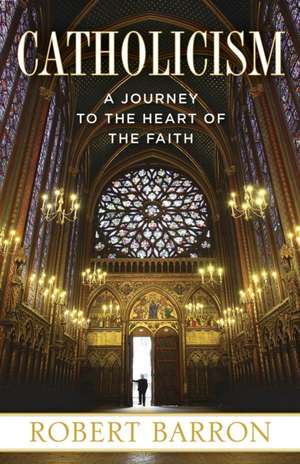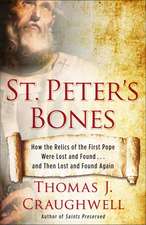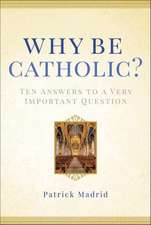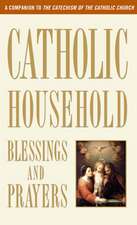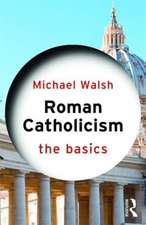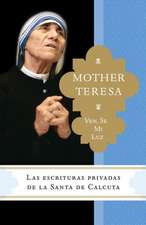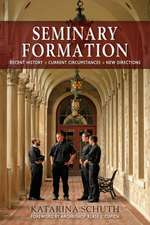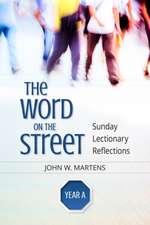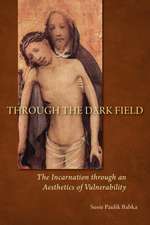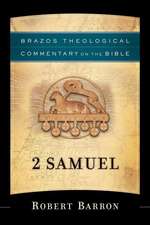Catholicism: A Journey to the Heart of the Faith
Autor Robert Barronen Limba Engleză Paperback – 3 mar 2014
Vezi toate premiile Carte premiată
Christian Retailing's Best (2012)
What is Catholicism? A 2,000 living tradition? A worldview? A way of life? A relationship? A mystery? In Catholicism Father Robert Barron examines all these questions and more, seeking to capture the body, heart and mind of the Catholic faith.
Starting from the essential foundation of Jesus Christ’s incarnation, life, and teaching, Father Barron moves through the defining elements of Catholicism ߝ from sacraments, worship, and prayer, to Mary, the Apostles, and Saints, to grace, salvation, heaven, and hell ߝ using his distinct and dynamic grasp of art, literature, architecture, personal stories, Scripture, theology, philosophy, and history to present the Church to the world.
Paired with his documentary film series of the same title, Catholicism is an intimate journey, capturing “The Catholic Thing” in all its depth and beauty. Eclectic, unique, and inspiring, Father Barron brings the faith to life for a new generation, in a style that is both faithful to timeless truths, while simultaneously speaking in the language of contemporary life.
Includes over 100 black and white and color photos.
Preț: 102.49 lei
Nou
Puncte Express: 154
Preț estimativ în valută:
19.61€ • 21.30$ • 16.48£
19.61€ • 21.30$ • 16.48£
Carte disponibilă
Livrare economică 01-15 aprilie
Preluare comenzi: 021 569.72.76
Specificații
ISBN-13: 9780307720528
ISBN-10: 0307720527
Pagini: 291
Ilustrații: 100 BLACK + WHITE PHOTOS T/O ONE 8-PAGE COLOR INSERTS
Dimensiuni: 132 x 206 x 22 mm
Greutate: 0.27 kg
Editura: IMAGE
ISBN-10: 0307720527
Pagini: 291
Ilustrații: 100 BLACK + WHITE PHOTOS T/O ONE 8-PAGE COLOR INSERTS
Dimensiuni: 132 x 206 x 22 mm
Greutate: 0.27 kg
Editura: IMAGE
Notă biografică
FATHER ROBERT BARRON is an acclaimed author, speaker, and theologian, and the founder of the international media ministry Word On Fire. Through television, radio, podcasts, his blog, and YouTube videos he pursues the simple but revolutionary mission of evangelizing the culture. Additionally, Father Barron is the Francis Cardinal George Chair of Faith and Culture at Mundelein Seminary, and the creator and host of Catholicism, a groundbreaking ten-part documentary series and study program about the Catholic Faith. For more information visit www.wordonfire.org.
From the Hardcover edition.
From the Hardcover edition.
Extras
Chapter 1
AMAZED AND AFRAID: THE REVELATION OF GOD BECOME MAN
It all begins with a jest. The essence of comedy is the coming together of opposites, the juxtaposition of incongruous things. So we laugh when an adult speaks like a child or when a simple man finds himself lost amid the complexities of sophisticated society. The central claim of Christianity--still startling after two thousand years--is that God became human. The Creator of the cosmos, who transcends any definition or concept, took to himself a nature like ours, becoming one of us. Christianity asserts that the infinite and the finite met, that the eternal and the temporal embraced, that the fashioner of the galaxies and planets became a baby too weak even to raise his head. And to make the humor even more pointed, this Incarnation of God was first made manifest not in Rome, Athens, or Babylon, not in a great cultural or political capital, but in Bethlehem of Judea, a tiny outpost in the corner of the Roman Empire. One might laugh derisively at this joke--as many have over the centuries--but, as G. K. Chesterton observed, the heart of even the most skeptical person is changed simply for having heard this message. Christian believers up and down the years are those who have laughed with delight at this sacred joke and have never tired of hearing it repeated, whether it is told in the sermons of Augustine, the arguments of Aquinas, the frescos of Michelangelo, the stained glass of Chartres, the mystical poetry of Teresa of Avila, or the little way of Therese of Lisieux. It has been suggested that the heart of sin is taking oneself too seriously. Perhaps this is why God chose to save us by making us laugh.
One of the most important things to understand about Christianity is that it is not primarily a philosophy or a system of ethics or a religious ideology. It is a relationship to the unsettling person of Jesus Christ, to the God-man. Someone stands at the center of Christian concern. Though Christian thinkers have used philosophical ideas and cultural constructs to articulate the meaning of the faith--sometimes in marvelously elaborate ways--they never, at their best, wander far from the very particular and unnerving first-century rabbi from Nazareth. But who precisely was he? We know next to nothing about the first thirty years of Jesus’s life. Though people have speculated wildly about these hidden years--that he traveled to India to learn the wisdom of the Buddha; that he sojourned in Egypt where he became adept at healing, and so forth--no reliable information concerning Jesus’s youth and young manhood exists, except perhaps the tantalizing story in Luke’s Gospel about the finding of Jesus in the temple. Since Joseph, the husband of Mary, Jesus’s mother, is described as a carpenter, we can safely assume that Jesus apprenticed to the carpentry trade while growing up. As far as we can determine, Jesus was not formally trained in a rabbinic school, nor was he educated to be a temple priest or a scribe, nor was he a devotee of the Pharisees, the Sadducees, or the Essenes--all recognized religious parties with particular convictions, practices, and doctrinal proclivities. He was, if I can use a somewhat anachronistic term, a layman.
And this made his arrival on the public scene all the more astounding. For this Nazarene carpenter, with no formal religious education or affiliation, began to speak and act with an unprecedented authority. To the crowds who listened to him preach, he blithely declared, “You have heard that it was said . . . but I say . . .” (Mt 5:21ߝ48). He was referring, of course, to the Torah, the teaching of Moses, the court of final appeal to any faithful rabbi; therefore he was claiming for himself an authority greater than that of Israel’s most significant teacher and lawgiver. To a paralyzed man, he says, “Courage, child, your sins are forgiven” (Mt 9:2). Grasping the outrageousness of this assertion, the bystanders remark to themselves, “This man is blaspheming” (Mt 2:3). Moreover, Jesus demonstrated a mastery over the very forces of nature. He tamed the storm that threatened to swamp his disciples’ boat; he rebuked the dark powers; he opened deaf ears and brought vision back to sightless eyes; he not only pardoned the paralyzed man’s sins--he took away his paralysis; he even raised the daughter of Jairus back to life. All of this made Jesus a figure of utter fascination. Again and again we hear in the Gospels how word of him spread throughout the country and how the crowds kept coming at him from all sides: “and on finding him [the disciples] said, ‘Everyone is looking for you’ ” (Mk 1:37). Why were they drawn to him? Some undoubtedly wanted to witness or benefit from his supernatural power; others wanted to hear the words of an unsurpassably charismatic rabbi; still others simply wanted to commune with a celebrity. But I think it’s fair to assume that all of them were wondering just who this man was.
Midway through his public ministry, Jesus ventured with his disciples to the northern reaches of the Promised Land, to the region of Caesarea-Philippi, near the present-day Golan Heights, and there he posed just that question: “Who do people say that I am?” (Mk 8:27). We’re so accustomed to hearing this question in the Gospels that we’ve lost a sense of its peculiarity. He didn’t ask them what people thought about his teaching or what impression he was making, or how the crowds were interpreting his actions--reasonable enough questions. He wanted to know what they thought about his identity, his being. And this question--reiterated by Christian theologians through the centuries--sets Jesus off from all of the other great religious founders. The Buddha actively discouraged his followers from focusing on his person, urging them instead to walk the spiritual way from which he himself had benefited. Mohammed was an ordinary man who claimed to have received Allah’s definitive revelation. He would never have dreamed of drawing attention to his own person; rather he wanted the world to read and abide by the Koran, which had been given to him. Confucius was a moral philosopher who, with particular acuity, formulated a series of ethical recommendations that constituted a balanced way of being in the world. The structure of his being was never a matter of concern either to him or to his followers.
And then there is Jesus. Though he did indeed formulate moral instructions and though he certainly taught with enormous enthusiasm, Jesus did not draw his followers’ attention primarily to his words. He drew it to himself. John the Baptist instructed two of his disciples to follow after Jesus. They asked the Lord, “Where are you staying?” (Jn 1:38) and he said, “Come, and you will see” (Jn 1:39). That simple exchange is enormously instructive, for it shows that intimacy with Jesus--staying with him--is what Christian discipleship is fundamentally about. This preoccupation with Jesus himself followed, as I’ve been hinting, from the startling fact that he consistently spoke and acted in the very person of God. “Heaven and earth will pass away, but my words will not pass away” (Mt 24:35). Sane philosophers and scholars invariably emphasize the provisional nature of what they write, but Jesus claims that his words will last longer than creation itself. Who could reasonably make this assertion except the one who is the Word through which all things came to be? “Whoever loves father or mother more than me is not worthy of me” (Mt 10:37). We could easily imagine a prophet, teacher, or religious founder saying, “You should love God more than your very life,” or at the limit, “You ought to love my teaching more than your mother and father,” but “unless you love me?” It has been said that the healthiest spiritual people are those who have the strongest sense of the difference between themselves and God. Therefore who could sanely and responsibly make the claim that Jesus made except the one who is, in his own person, the highest good?
Now, the possibility remains that Jesus might have been a madman, a deluded fanatic. After all, mental health facilities are filled with people who think they are God. And this is precisely what some of Jesus’s contemporaries thought: “For this reason the Jews tried all the more to kill him; because . . . he . . . called God his own father, making himself equal to God” (Jn 5:18). What is ruled out--and C. S. Lewis saw this with particular clarity--is the bland middle position taken by many theologians and religious seekers today, namely that Jesus wasn’t divine but was indeed an inspiring ethical teacher, a great religious philosopher. Yet a close reading of the Gospel witness does not bear such an interpretation. Given that he repeatedly spoke and acted in the person of God, either he was who he said he was and purported to be, or he was a bad man. And this is precisely why Jesus compels a choice the way no other religious founder does. As he himself said, “Whoever is not with me is against me” (Lk 11:23), and “Whoever does not gather with me scatters” (Lk 11:23). I realize how dramatically this runs counter to our sensibilities, but Christian evangelization consists in the forcing of that choice.
There is a strange passage in the tenth chapter of Mark’s Gospel that is rarely commented upon but that is, in its peculiarity, very telling. Jesus is in the company of his disciples, and they are making their way from Galilee in the north to Judea in the south. Mark reports: “They were on the way, going up to Jerusalem, and Jesus went ahead of them. They were amazed, and those who followed were afraid” (Mk 10:32). They were simply walking along the road with Jesus, and they found him overwhelming and frightening. Why they should have had such a response remains inexplicable until we remember that awe and fear are, in the Old Testament tradition, two standard reactions to God. The twentieth-century philosopher of religion Rudolf Otto famously characterized the transcendent God as the mysterium tremendum et fascinans, the mystery that fascinates us even as it causes us to tremble with fear--in whose presence we are amazed and afraid. In his sly, understated way, Mark is telling us that this Jesus is also the God of Israel.
Once we grasp that Jesus was no ordinary teacher and healer but Yahweh moving among his people, we can begin to understand his words and actions more clearly. If we survey the texts of the Old Testament--and the first Christians relentlessly read Jesus in light of these writings--we see that Yahweh was expected to do four great things. He would gather the scattered tribes of Israel; he would cleanse the Temple of Jerusalem; he would definitively deal with the enemies of the nation; and, finally, he would reign as Lord of heaven and earth. The eschatological hope expressed especially in the prophets and the Psalms was that through these actions, Yahweh would purify Israel and through the purified Israel bring salvation to all. What startled the first followers of Jesus was that he accomplished these four tasks but in the most unexpected way.
When Jesus first emerged, preaching in the villages surrounding the Sea of Galilee, he had a simple message: “The kingdom of God is at hand. Repent, and believe in the Gospel” (Mk 1:15). Oceans of ink have been spilled over the centuries in an attempt to explain the meaning of “Kingdom of God,” but it might be useful to inquire what Jesus’s first audience understood by that term. N. T. Wright argues that they would have heard, “the tribes are being gathered.” According to the basic narrative of the Old Testament, God’s answer to human dysfunction was the formation of a people after his own heart. Yahweh chose Abraham and his descendants to be “peculiarly his own,” and he shaped them by the divine law to be a priestly nation. God’s intention was that a unified and spiritually vibrant Israel would function as a magnet for the rest of humanity, drawing everyone to God by the sheer attractive quality of their way of being. The prophet Isaiah expressed this hope when he imagined Mount Zion, raised high above all of the mountains of the world, as the gathering point for “all the tribes of the earth.” But the tragedy was that more often than not Israel was unfaithful to its calling and became therefore a scattered nation. One of the typical biblical names for the devil is ho diabalos, derived from the term diabalein (to throw apart). If God is a great gathering force, then sin is a scattering power. This dividing of Israel came to fullest expression in the eighth century BC, when many of the northern tribes were carried off by the invading Assyrians, and even more so in the devastating exile of the sixth century BC when the Babylonians destroyed Jerusalem and carried many of the southern tribes away. A scattered, divided Israel could never live up to its vocation, but the prophets continued to dream and hope. Ezekiel spoke of Israel as sheep wandering aimlessly on the hillside, but then he prophesied that one day Yahweh himself would come and gather in his people.
Now we can begin to understand the behavior of the one who called himself “the good shepherd” (Jn 10:11). As so many contemporary scholars have emphasized, Jesus practiced open table fellowship, serving as host for many who would normally be excluded from polite society: the public sinner, the prostitute, the handicapped, the tax collector. At the very place where, in his time as well as ours, the stratifications and divisions of society were often on clearest display, he was making possible a new kind of social space, one marked by compassion and forgiveness. It is important to note that he was not simply exemplifying the generic virtue of “inclusivity” so valued today; he was acting in the very person of Yahweh gathering in his scattered children. This helps to explain why he healed so many. In the society of Jesus’s time, physical illness was typically construed as a curse, and in many cases sickness or deformity prevented one from participating fully in the life of the community, especially in common worship. Curing the blind, the deaf, the lame, and the leprous, Jesus was Yahweh binding up the wounds of his people and restoring them to communion.
From the Hardcover edition.
AMAZED AND AFRAID: THE REVELATION OF GOD BECOME MAN
It all begins with a jest. The essence of comedy is the coming together of opposites, the juxtaposition of incongruous things. So we laugh when an adult speaks like a child or when a simple man finds himself lost amid the complexities of sophisticated society. The central claim of Christianity--still startling after two thousand years--is that God became human. The Creator of the cosmos, who transcends any definition or concept, took to himself a nature like ours, becoming one of us. Christianity asserts that the infinite and the finite met, that the eternal and the temporal embraced, that the fashioner of the galaxies and planets became a baby too weak even to raise his head. And to make the humor even more pointed, this Incarnation of God was first made manifest not in Rome, Athens, or Babylon, not in a great cultural or political capital, but in Bethlehem of Judea, a tiny outpost in the corner of the Roman Empire. One might laugh derisively at this joke--as many have over the centuries--but, as G. K. Chesterton observed, the heart of even the most skeptical person is changed simply for having heard this message. Christian believers up and down the years are those who have laughed with delight at this sacred joke and have never tired of hearing it repeated, whether it is told in the sermons of Augustine, the arguments of Aquinas, the frescos of Michelangelo, the stained glass of Chartres, the mystical poetry of Teresa of Avila, or the little way of Therese of Lisieux. It has been suggested that the heart of sin is taking oneself too seriously. Perhaps this is why God chose to save us by making us laugh.
One of the most important things to understand about Christianity is that it is not primarily a philosophy or a system of ethics or a religious ideology. It is a relationship to the unsettling person of Jesus Christ, to the God-man. Someone stands at the center of Christian concern. Though Christian thinkers have used philosophical ideas and cultural constructs to articulate the meaning of the faith--sometimes in marvelously elaborate ways--they never, at their best, wander far from the very particular and unnerving first-century rabbi from Nazareth. But who precisely was he? We know next to nothing about the first thirty years of Jesus’s life. Though people have speculated wildly about these hidden years--that he traveled to India to learn the wisdom of the Buddha; that he sojourned in Egypt where he became adept at healing, and so forth--no reliable information concerning Jesus’s youth and young manhood exists, except perhaps the tantalizing story in Luke’s Gospel about the finding of Jesus in the temple. Since Joseph, the husband of Mary, Jesus’s mother, is described as a carpenter, we can safely assume that Jesus apprenticed to the carpentry trade while growing up. As far as we can determine, Jesus was not formally trained in a rabbinic school, nor was he educated to be a temple priest or a scribe, nor was he a devotee of the Pharisees, the Sadducees, or the Essenes--all recognized religious parties with particular convictions, practices, and doctrinal proclivities. He was, if I can use a somewhat anachronistic term, a layman.
And this made his arrival on the public scene all the more astounding. For this Nazarene carpenter, with no formal religious education or affiliation, began to speak and act with an unprecedented authority. To the crowds who listened to him preach, he blithely declared, “You have heard that it was said . . . but I say . . .” (Mt 5:21ߝ48). He was referring, of course, to the Torah, the teaching of Moses, the court of final appeal to any faithful rabbi; therefore he was claiming for himself an authority greater than that of Israel’s most significant teacher and lawgiver. To a paralyzed man, he says, “Courage, child, your sins are forgiven” (Mt 9:2). Grasping the outrageousness of this assertion, the bystanders remark to themselves, “This man is blaspheming” (Mt 2:3). Moreover, Jesus demonstrated a mastery over the very forces of nature. He tamed the storm that threatened to swamp his disciples’ boat; he rebuked the dark powers; he opened deaf ears and brought vision back to sightless eyes; he not only pardoned the paralyzed man’s sins--he took away his paralysis; he even raised the daughter of Jairus back to life. All of this made Jesus a figure of utter fascination. Again and again we hear in the Gospels how word of him spread throughout the country and how the crowds kept coming at him from all sides: “and on finding him [the disciples] said, ‘Everyone is looking for you’ ” (Mk 1:37). Why were they drawn to him? Some undoubtedly wanted to witness or benefit from his supernatural power; others wanted to hear the words of an unsurpassably charismatic rabbi; still others simply wanted to commune with a celebrity. But I think it’s fair to assume that all of them were wondering just who this man was.
Midway through his public ministry, Jesus ventured with his disciples to the northern reaches of the Promised Land, to the region of Caesarea-Philippi, near the present-day Golan Heights, and there he posed just that question: “Who do people say that I am?” (Mk 8:27). We’re so accustomed to hearing this question in the Gospels that we’ve lost a sense of its peculiarity. He didn’t ask them what people thought about his teaching or what impression he was making, or how the crowds were interpreting his actions--reasonable enough questions. He wanted to know what they thought about his identity, his being. And this question--reiterated by Christian theologians through the centuries--sets Jesus off from all of the other great religious founders. The Buddha actively discouraged his followers from focusing on his person, urging them instead to walk the spiritual way from which he himself had benefited. Mohammed was an ordinary man who claimed to have received Allah’s definitive revelation. He would never have dreamed of drawing attention to his own person; rather he wanted the world to read and abide by the Koran, which had been given to him. Confucius was a moral philosopher who, with particular acuity, formulated a series of ethical recommendations that constituted a balanced way of being in the world. The structure of his being was never a matter of concern either to him or to his followers.
And then there is Jesus. Though he did indeed formulate moral instructions and though he certainly taught with enormous enthusiasm, Jesus did not draw his followers’ attention primarily to his words. He drew it to himself. John the Baptist instructed two of his disciples to follow after Jesus. They asked the Lord, “Where are you staying?” (Jn 1:38) and he said, “Come, and you will see” (Jn 1:39). That simple exchange is enormously instructive, for it shows that intimacy with Jesus--staying with him--is what Christian discipleship is fundamentally about. This preoccupation with Jesus himself followed, as I’ve been hinting, from the startling fact that he consistently spoke and acted in the very person of God. “Heaven and earth will pass away, but my words will not pass away” (Mt 24:35). Sane philosophers and scholars invariably emphasize the provisional nature of what they write, but Jesus claims that his words will last longer than creation itself. Who could reasonably make this assertion except the one who is the Word through which all things came to be? “Whoever loves father or mother more than me is not worthy of me” (Mt 10:37). We could easily imagine a prophet, teacher, or religious founder saying, “You should love God more than your very life,” or at the limit, “You ought to love my teaching more than your mother and father,” but “unless you love me?” It has been said that the healthiest spiritual people are those who have the strongest sense of the difference between themselves and God. Therefore who could sanely and responsibly make the claim that Jesus made except the one who is, in his own person, the highest good?
Now, the possibility remains that Jesus might have been a madman, a deluded fanatic. After all, mental health facilities are filled with people who think they are God. And this is precisely what some of Jesus’s contemporaries thought: “For this reason the Jews tried all the more to kill him; because . . . he . . . called God his own father, making himself equal to God” (Jn 5:18). What is ruled out--and C. S. Lewis saw this with particular clarity--is the bland middle position taken by many theologians and religious seekers today, namely that Jesus wasn’t divine but was indeed an inspiring ethical teacher, a great religious philosopher. Yet a close reading of the Gospel witness does not bear such an interpretation. Given that he repeatedly spoke and acted in the person of God, either he was who he said he was and purported to be, or he was a bad man. And this is precisely why Jesus compels a choice the way no other religious founder does. As he himself said, “Whoever is not with me is against me” (Lk 11:23), and “Whoever does not gather with me scatters” (Lk 11:23). I realize how dramatically this runs counter to our sensibilities, but Christian evangelization consists in the forcing of that choice.
There is a strange passage in the tenth chapter of Mark’s Gospel that is rarely commented upon but that is, in its peculiarity, very telling. Jesus is in the company of his disciples, and they are making their way from Galilee in the north to Judea in the south. Mark reports: “They were on the way, going up to Jerusalem, and Jesus went ahead of them. They were amazed, and those who followed were afraid” (Mk 10:32). They were simply walking along the road with Jesus, and they found him overwhelming and frightening. Why they should have had such a response remains inexplicable until we remember that awe and fear are, in the Old Testament tradition, two standard reactions to God. The twentieth-century philosopher of religion Rudolf Otto famously characterized the transcendent God as the mysterium tremendum et fascinans, the mystery that fascinates us even as it causes us to tremble with fear--in whose presence we are amazed and afraid. In his sly, understated way, Mark is telling us that this Jesus is also the God of Israel.
Once we grasp that Jesus was no ordinary teacher and healer but Yahweh moving among his people, we can begin to understand his words and actions more clearly. If we survey the texts of the Old Testament--and the first Christians relentlessly read Jesus in light of these writings--we see that Yahweh was expected to do four great things. He would gather the scattered tribes of Israel; he would cleanse the Temple of Jerusalem; he would definitively deal with the enemies of the nation; and, finally, he would reign as Lord of heaven and earth. The eschatological hope expressed especially in the prophets and the Psalms was that through these actions, Yahweh would purify Israel and through the purified Israel bring salvation to all. What startled the first followers of Jesus was that he accomplished these four tasks but in the most unexpected way.
When Jesus first emerged, preaching in the villages surrounding the Sea of Galilee, he had a simple message: “The kingdom of God is at hand. Repent, and believe in the Gospel” (Mk 1:15). Oceans of ink have been spilled over the centuries in an attempt to explain the meaning of “Kingdom of God,” but it might be useful to inquire what Jesus’s first audience understood by that term. N. T. Wright argues that they would have heard, “the tribes are being gathered.” According to the basic narrative of the Old Testament, God’s answer to human dysfunction was the formation of a people after his own heart. Yahweh chose Abraham and his descendants to be “peculiarly his own,” and he shaped them by the divine law to be a priestly nation. God’s intention was that a unified and spiritually vibrant Israel would function as a magnet for the rest of humanity, drawing everyone to God by the sheer attractive quality of their way of being. The prophet Isaiah expressed this hope when he imagined Mount Zion, raised high above all of the mountains of the world, as the gathering point for “all the tribes of the earth.” But the tragedy was that more often than not Israel was unfaithful to its calling and became therefore a scattered nation. One of the typical biblical names for the devil is ho diabalos, derived from the term diabalein (to throw apart). If God is a great gathering force, then sin is a scattering power. This dividing of Israel came to fullest expression in the eighth century BC, when many of the northern tribes were carried off by the invading Assyrians, and even more so in the devastating exile of the sixth century BC when the Babylonians destroyed Jerusalem and carried many of the southern tribes away. A scattered, divided Israel could never live up to its vocation, but the prophets continued to dream and hope. Ezekiel spoke of Israel as sheep wandering aimlessly on the hillside, but then he prophesied that one day Yahweh himself would come and gather in his people.
Now we can begin to understand the behavior of the one who called himself “the good shepherd” (Jn 10:11). As so many contemporary scholars have emphasized, Jesus practiced open table fellowship, serving as host for many who would normally be excluded from polite society: the public sinner, the prostitute, the handicapped, the tax collector. At the very place where, in his time as well as ours, the stratifications and divisions of society were often on clearest display, he was making possible a new kind of social space, one marked by compassion and forgiveness. It is important to note that he was not simply exemplifying the generic virtue of “inclusivity” so valued today; he was acting in the very person of Yahweh gathering in his scattered children. This helps to explain why he healed so many. In the society of Jesus’s time, physical illness was typically construed as a curse, and in many cases sickness or deformity prevented one from participating fully in the life of the community, especially in common worship. Curing the blind, the deaf, the lame, and the leprous, Jesus was Yahweh binding up the wounds of his people and restoring them to communion.
From the Hardcover edition.
Recenzii
“Clarity, intelligence, passion and elegance ߝ these are the marks of a writer in top form, and Father Barron brings all these gifts to bear in this extraordinary reflection on the Catholic faith. If you read one book this year on what Catholics believe and why, this is the book to read ߝ and to share with others.” ߝCharles J. Chaput, O.F.M. Cap, Archbishop of Denver
“Father Robert Barron’s Catholicism: A Journey to the Heart of the Faith takes a path less traveled in leading us to explore the faith through stories, biographies, and images. In these pages, we meet the “Word made Flesh” not only in theological formulations, but also in saints and poets, cathedrals and chants, priests and prophets. What makes Catholicism so compelling are the ways in which Father Barron shows how the Incarnation goes on in the true, the good, and the beautiful.” ߝ Timothy M. Dolan, Archbishop of New York
“Catholicism is one of the most significant efforts ever to advance what Pope John Paul II called ‘The New Evangelization.’” ߝGeorge Weigel, author of Witness to Hope and The End and the Beginning
“Prepare yourself for an entrancing tour of the many facets of Catholicism. From Her art to Her architecture, Her theological riches, to the inspired personalities that have filled Her pews, the Catholic Church is laid bare by a priest who is more than up to the task. Like the Faith it seeks to capture, it is a journey that will leave you full ߝ and then hungering for more.” ߝRaymond Arroyo, New York Times Bestselling Author of Mother Angelica and host of EWTN's The World Over Live
“Father Robert Barron is a brilliant academic, a popular writer, a seeker and a seer. In Catholicism he illuminates truths that have the power to set us free. It will be a benchmark book for years to come.” ߝMichael Leach, author of Why Stay Catholic?
“When Father Barron is talking, I can't stop listening. Whatever he writes, I can't put down unfinished. He loves the people he addresses. He writes about what matters to us. To read him is to be loved in word after word. In these pages, heart speaks to heart.” ߝMike Aquilina, co-author of The Mass: The Glory, the Mystery, the Tradition
“Father Robert Barron’s great gift is to wed intellectual depth with clarity and vividness of expression. His Catholicism: A Journey to the Heart of the Faith is a superb exploration of the Catholic vision that seamlessly unites theological reflection and masterpieces of architecture and art. The story he tells comes truly alive in his portraits of concrete men and women who, in every age, have lived the journey of faith to the full. ߝ”Rev. Robert Imbelli is Associate Professor of Theology at Boston College
From the Hardcover edition.
“Father Robert Barron’s Catholicism: A Journey to the Heart of the Faith takes a path less traveled in leading us to explore the faith through stories, biographies, and images. In these pages, we meet the “Word made Flesh” not only in theological formulations, but also in saints and poets, cathedrals and chants, priests and prophets. What makes Catholicism so compelling are the ways in which Father Barron shows how the Incarnation goes on in the true, the good, and the beautiful.” ߝ Timothy M. Dolan, Archbishop of New York
“Catholicism is one of the most significant efforts ever to advance what Pope John Paul II called ‘The New Evangelization.’” ߝGeorge Weigel, author of Witness to Hope and The End and the Beginning
“Prepare yourself for an entrancing tour of the many facets of Catholicism. From Her art to Her architecture, Her theological riches, to the inspired personalities that have filled Her pews, the Catholic Church is laid bare by a priest who is more than up to the task. Like the Faith it seeks to capture, it is a journey that will leave you full ߝ and then hungering for more.” ߝRaymond Arroyo, New York Times Bestselling Author of Mother Angelica and host of EWTN's The World Over Live
“Father Robert Barron is a brilliant academic, a popular writer, a seeker and a seer. In Catholicism he illuminates truths that have the power to set us free. It will be a benchmark book for years to come.” ߝMichael Leach, author of Why Stay Catholic?
“When Father Barron is talking, I can't stop listening. Whatever he writes, I can't put down unfinished. He loves the people he addresses. He writes about what matters to us. To read him is to be loved in word after word. In these pages, heart speaks to heart.” ߝMike Aquilina, co-author of The Mass: The Glory, the Mystery, the Tradition
“Father Robert Barron’s great gift is to wed intellectual depth with clarity and vividness of expression. His Catholicism: A Journey to the Heart of the Faith is a superb exploration of the Catholic vision that seamlessly unites theological reflection and masterpieces of architecture and art. The story he tells comes truly alive in his portraits of concrete men and women who, in every age, have lived the journey of faith to the full. ߝ”Rev. Robert Imbelli is Associate Professor of Theology at Boston College
From the Hardcover edition.
Premii
- Christian Retailing's Best Nominee, 2012
